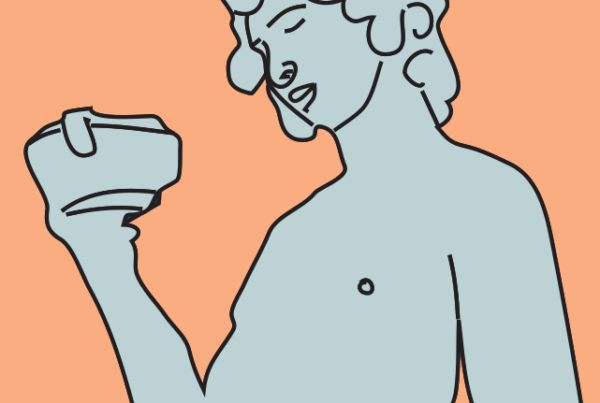

I feel like I always have the potential to rise against something. The feeling awaits within me like a flame that is ready to be torched with the right spark. I have the impression that most people of our generation share these feelings to a certain degree; most of us feel a moral obligation to oppose something.
On social media we are constantly being bombarded with problems we can direct our attention and effort towards. But I only have a limited amount of time, energy, and resources to feed this moral hunger, and no matter how much I feed it, I still feel I am starving. For example, no matter how much I work towards a sustainable lifestyle, work for a sustainability organization, or try to be vocal about climate change, I still feel like there is more I can do. I can never satiate this hunger and it is overwhelming.
The worst part is that we are actually not that sure about the repercussions of our well-intentioned endeavours. The complexities of our globalized world have made predicting the consequences of our actions nearly impossible, nonetheless the social group we identify with usually forces a moral absolute on us: we have to rise against the ‘evil’. One’s social identity pressurizes one to rise against their group’s own relative evil, and this action of rising is depicted as a very simple and incontestable moral imperative.
Then, please tell me, what exactly is this evil we are rising against? Every group has their own extremely vague concepts of evil such as capitalism, cooperations, corruption, racism, sexism. There are rights and wrongs in this world, there should be. We really should possess a moral code. However, it is the next step that should be avoided, attributing this evil to certain individuals or groups. Human beings are already inclined to do this, and when these evil concepts are already vague, the collective seeks a concrete target to direct their effort. As a result, this usually deepens the divide between different groups in society, as every group sees each other as the flesh-and-blood manifestations of their own evils.
This highlights the importance of knowing and understanding the nuance of the situation when engaging in any kind of performative action, and avoiding an oversimplification of the problem. We should holistically look at the past, the present, and the future. We first need to develop an understanding of the usually centuries old roots of the situation; the present circumstances are usually the result of complex structural problems engraved in our society. We also need to acknowledge that what we are doing might have desired consequences as well as undesirable ones; not a single performative action has resulted in purely positive outcomes for everyone, and that is why we should not advertise it as a moral absolute.
I do want to rise for what I believe is right. However, as a social psychologist-to-be, I do not want to contribute to widening the divide between groups in society. We need to be strategic in the way we want to accomplish change, and we need to have solid plans for change in order to not fall into evilizing outgroups. This way of thinking feels much more oriented to solving the problem rationally, rather than to engage in performative action to outpour emotions of frustration, or to experience the thrilling nature of participation and to be part of something bigger than yourself. We need to be first and foremost oriented towards change.

I feel like I always have the potential to rise against something. The feeling awaits within me like a flame that is ready to be torched with the right spark. I have the impression that most people of our generation share these feelings to a certain degree; most of us feel a moral obligation to oppose something.
On social media we are constantly being bombarded with problems we can direct our attention and effort towards. But I only have a limited amount of time, energy, and resources to feed this moral hunger, and no matter how much I feed it, I still feel I am starving. For example, no matter how much I work towards a sustainable lifestyle, work for a sustainability organization, or try to be vocal about climate change, I still feel like there is more I can do. I can never satiate this hunger and it is overwhelming.
The worst part is that we are actually not that sure about the repercussions of our well-intentioned endeavours. The complexities of our globalized world have made predicting the consequences of our actions nearly impossible, nonetheless the social group we identify with usually forces a moral absolute on us: we have to rise against the ‘evil’. One’s social identity pressurizes one to rise against their group’s own relative evil, and this action of rising is depicted as a very simple and incontestable moral imperative.
Then, please tell me, what exactly is this evil we are rising against? Every group has their own extremely vague concepts of evil such as capitalism, cooperations, corruption, racism, sexism. There are rights and wrongs in this world, there should be. We really should possess a moral code. However, it is the next step that should be avoided, attributing this evil to certain individuals or groups. Human beings are already inclined to do this, and when these evil concepts are already vague, the collective seeks a concrete target to direct their effort. As a result, this usually deepens the divide between different groups in society, as every group sees each other as the flesh-and-blood manifestations of their own evils.
This highlights the importance of knowing and understanding the nuance of the situation when engaging in any kind of performative action, and avoiding an oversimplification of the problem. We should holistically look at the past, the present, and the future. We first need to develop an understanding of the usually centuries old roots of the situation; the present circumstances are usually the result of complex structural problems engraved in our society. We also need to acknowledge that what we are doing might have desired consequences as well as undesirable ones; not a single performative action has resulted in purely positive outcomes for everyone, and that is why we should not advertise it as a moral absolute.
I do want to rise for what I believe is right. However, as a social psychologist-to-be, I do not want to contribute to widening the divide between groups in society. We need to be strategic in the way we want to accomplish change, and we need to have solid plans for change in order to not fall into evilizing outgroups. This way of thinking feels much more oriented to solving the problem rationally, rather than to engage in performative action to outpour emotions of frustration, or to experience the thrilling nature of participation and to be part of something bigger than yourself. We need to be first and foremost oriented towards change.



